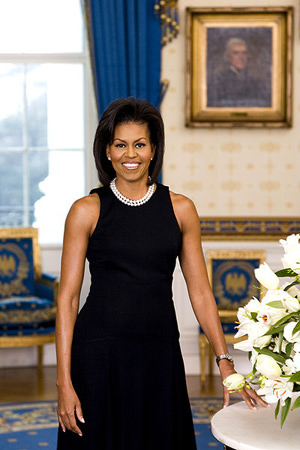The FLOTUS and the Twitterverse
Michelle Obama joined Twitter on Thursday. For some this doesn't qualify as news in a world full of political and economic turmoil.
Michelle Obama joined Twitter on Thursday. For some this doesn’t qualify as news in a world full of political and economic turmoil. For others, the first lady’s first tweet — “Hi Everyone, and thanks for the warm welcome. Look forward to staying in touch with you here. –mo” — is part of a larger story about stereotyping and how it intersects with race, gender, nation and culture in the news.
In a story that broke after the publication of Jodi Kantor’s “The Obamas,” Mrs. Obama told “CBS This Morning” that she would not be reading the New York Times reporter’s book. Why? Because she refuses to pay attention to those who portray her as a surreptitious force in the White House, one whose strong opinions lead to conflicts with the president’s team. Mrs. Obama suggested that if we wanted to know more about her, we should turn to her directly. “There will always be people who don’t like me,” she said, adding that she’s “just trying to be me, and I just hope that over time, that people get to know me.” Perhaps that’s exactly what her 150,000-plus followers will get: a backstage pass without the gimmicks of spin and stereotyping.
But there’s more to this story than meets the eye. Take the following remark made by Mrs. Obama in the CBS News interview: “I guess it’s just more interesting to imagine this conflicted situation here. … That’s been an image people have tried to paint of me since the day Barack announced, that I’m some kind of angry black woman.”
Since that day in early 2007, Mrs. Obama has been cast as “her husband’s darker side,” according to D. Soyini Madison, a professor of performance studies at Northwestern University. And as a result she came to represent what many people feared about the president: that he really wasn’t one of us and really wasn’t a patriot. In a 2009 academic article, professor Madison breaks down the campaign waged against the first lady’s public image. When Mrs. Obama said she was proud of her country for the ‘‘first time,’’ she was angry and unpatriotic. When she remarked that her husband as president would be susceptible to physical risk because he was a black man, she was unpatriotic and racist.
Soon after that, Juan Williams, a black neoconservative on Fox News, warned audiences that Mrs. Obama was ‘‘Stokely Carmichael in a dress.’’ Sean Hannity said she was ‘‘bitter’’ and content only when focusing on ‘‘despair and hopelessness.’’ The controversy raged as the Daily Kos exposed an image of her as branded and lynched. And let’s not forget the New Yorker’s controversial cartoon cover of her burning the American flag, sporting military fatigues and an afro, carrying a machine gun and saluting her husband with what Fox News dubbed ‘‘the terrorist fist jab.’’
Now, just as the president is up for re-election, Mrs. Obama is cast as an angry black woman again. But it remains to be seen whether the label will stick. Considering the first lady’s second tweet — “Here’s something near and dear to my heart – the MLK Day of Service. Will you join me to serve your community on Monday? – mo” — I don’t think it will.
I think that the first lady will be using her Twitter account to present a counterbalancing image to the “angry black woman” stereotype. And that these messages might make us think differently about what race and gender really look and sound like, by emphasizing her own brand of patriotism and adding new dimensions to what it means to be an ‘‘American.’’ More than that, I think she’ll be sending an important message to the press: Do report that racial and gender stereotyping exist. Do report that stereotyping frustrates those it affects most. And do remember that journalists are not immune to enhancing those stereotypes, a fact that can make the task of exposing them particularly challenging.
As stories about Michelle Obama’s public image continue to develop, professional journalists and citizen journalists alike would be wise to approach the topic as an institutional problem and not simply as a public relations issue disconnected from larger political trends. Reporters should also be willing to turn the “journalistic gaze” on themselves and consider how the process of explicitly questioning racist and sexist stereotypes can reveal the racialization and sexualization of news production itself.
Your support matters…Independent journalism is under threat and overshadowed by heavily funded mainstream media.
You can help level the playing field. Become a member.
Your tax-deductible contribution keeps us digging beneath the headlines to give you thought-provoking, investigative reporting and analysis that unearths what's really happening- without compromise.
Give today to support our courageous, independent journalists.






You need to be a supporter to comment.
There are currently no responses to this article.
Be the first to respond.